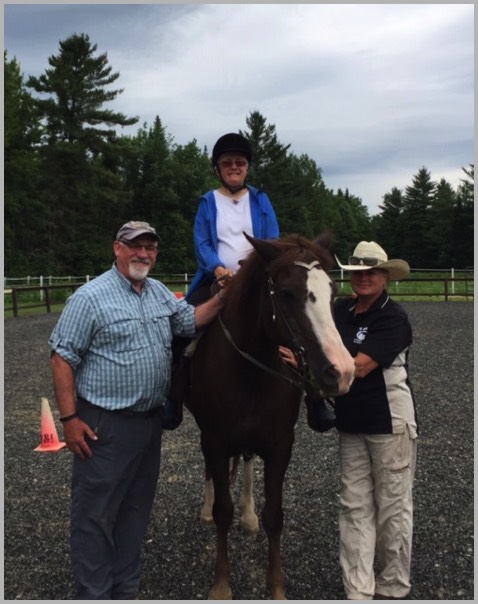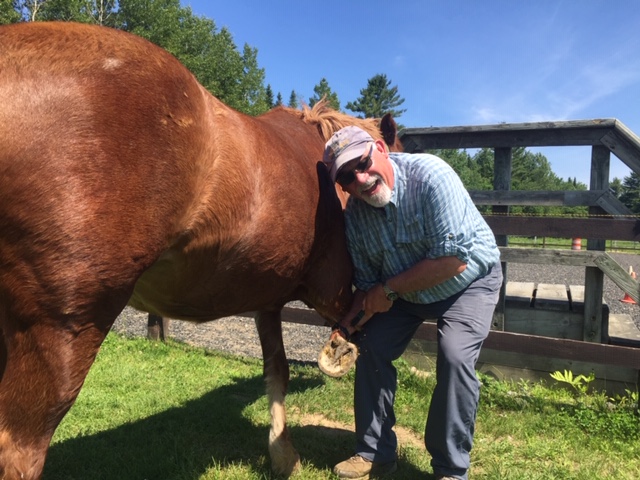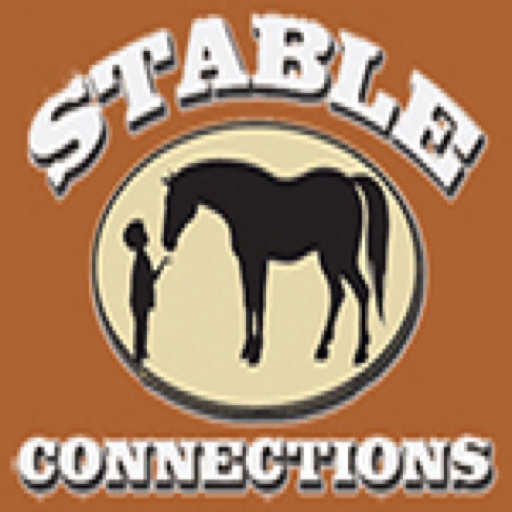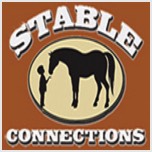
A Day at Stable Connections, by Ed Hermenau
On Tuesday July 16, 2019 I had the pleasure of spending the day with Karen Guile-Caron, the Executive Director and founder of Stable Connections, an Equine Assisted Therapy and Learning Facility in Guildhall, Vermont.
I have known Karen for a number of years, and have always been curious as to the services that she provides and the special people that she serves. Other than studying some information on the website, I had no idea what to expect from my day; what unfolded was an extremely educational and enjoyable experience.
Before the first client arrived, Karen explained that Stable Connections, Inc. is a 501(c)3 non-profit charitable organization, dedicated to enriching the lives of individuals living in northern New Hampshire and Vermont. Using Equine Assisted Therapy, Stable Connections offers a multitude of programs, such as Team Building Workshops, Veterans Workshops, Horses Healing Seniors, Equine Assisted Psychotherapy, Therapeutic Horsemanship and traditional riding lessons, providing a unique opportunity for educational and personal growth.
In addition to speaking about the programs offered and the community groups that she serves, she described the positive long-term benefits that have been realized by individuals who have participated in her programs. From young children born with drug addiction, to children and adults with Autism and ADHD or ADD, to Veterans with PTSD (Post Traumatic Stress Disorder), to people affected by Cerebral Palsy, mental health and various social and emotional issues, Stable Connections provides services to a wide range of populations.
Karen is continuously focused on meeting the ever changing needs of the groups that she serves and two years ago she began offering her “Mobile Equine Service” where she trailers horses to various locations to work with clients that do not have the ability to come to her. She told me that one of her favorite programs is “Horses Healing Seniors”, where she brings a horse to nursing homes to help residents who may have emotional challenges.
In viewing the Stable Connections website prior to my visit, I watched a video made by Nathan Smith, one of the clients involved in the Pathfinder’s Workshop, a program designed to assist veterans in the challenges they face in their daily lives. He was wounded in 2004 and has participated in several support programs over the years, but he credits Stable Connections’ program for empowering him to make major changes in his life.
The team building program enabled him to better interact and communicate with others, and Nathan credits his enhanced communication skills with improving his family life, stating that his children have commented on the positive change that he has exhibited.
She also shared a major success story about a client that has suffered from Reactive Attachment Disorder. The client, an adolescent at the time, had attempted to burn down the family house and had also attempted suicide. Both arson and suicide are symptoms of the disorder. The equine assisted psychotherapy program helped this client tremendously, and that young person has gone on to attend and graduate from college.
In addition to the dedicated staff, there are six horses that are used for the programs. Karen explains that the size of the horse makes a difference with her therapeutic riding clients. There are four that are perfect for that program but in equine assisted psychotherapy, the size or age of the horse does not matter, only the health of the horse. All six horses are used for psychotherapy or workshops.
Stable Connections was established ten years ago with just two horses and over the years, six other horses have been donated to the program. The horses are various breeds and different sizes but have one common thread, the ability to connect closely with the clients.
Horses, as herd animals that need to be wary of threats, are instinctively aware of their surroundings and so have an innate ability to read human body language. Karen has fine-tuned her skills to interpret what they are communicating to the client and/or staff. I had heard about the horse/human connection but had never had the opportunity to view it first-hand. It was very impressive and touching to watch Karen interact with the horses and the clients.
I have known Karen for a number of years, and have always been curious as to the services that she provides and the special people that she serves. Other than studying some information on the website, I had no idea what to expect from my day; what unfolded was an extremely educational and enjoyable experience.
Before the first client arrived, Karen explained that Stable Connections, Inc. is a 501(c)3 non-profit charitable organization, dedicated to enriching the lives of individuals living in northern New Hampshire and Vermont. Using Equine Assisted Therapy, Stable Connections offers a multitude of programs, such as Team Building Workshops, Veterans Workshops, Horses Healing Seniors, Equine Assisted Psychotherapy, Therapeutic Horsemanship and traditional riding lessons, providing a unique opportunity for educational and personal growth.
In addition to speaking about the programs offered and the community groups that she serves, she described the positive long-term benefits that have been realized by individuals who have participated in her programs. From young children born with drug addiction, to children and adults with Autism and ADHD or ADD, to Veterans with PTSD (Post Traumatic Stress Disorder), to people affected by Cerebral Palsy, mental health and various social and emotional issues, Stable Connections provides services to a wide range of populations.
Karen is continuously focused on meeting the ever changing needs of the groups that she serves and two years ago she began offering her “Mobile Equine Service” where she trailers horses to various locations to work with clients that do not have the ability to come to her. She told me that one of her favorite programs is “Horses Healing Seniors”, where she brings a horse to nursing homes to help residents who may have emotional challenges.
In viewing the Stable Connections website prior to my visit, I watched a video made by Nathan Smith, one of the clients involved in the Pathfinder’s Workshop, a program designed to assist veterans in the challenges they face in their daily lives. He was wounded in 2004 and has participated in several support programs over the years, but he credits Stable Connections’ program for empowering him to make major changes in his life.
The team building program enabled him to better interact and communicate with others, and Nathan credits his enhanced communication skills with improving his family life, stating that his children have commented on the positive change that he has exhibited.
She also shared a major success story about a client that has suffered from Reactive Attachment Disorder. The client, an adolescent at the time, had attempted to burn down the family house and had also attempted suicide. Both arson and suicide are symptoms of the disorder. The equine assisted psychotherapy program helped this client tremendously, and that young person has gone on to attend and graduate from college.
In addition to the dedicated staff, there are six horses that are used for the programs. Karen explains that the size of the horse makes a difference with her therapeutic riding clients. There are four that are perfect for that program but in equine assisted psychotherapy, the size or age of the horse does not matter, only the health of the horse. All six horses are used for psychotherapy or workshops.
Stable Connections was established ten years ago with just two horses and over the years, six other horses have been donated to the program. The horses are various breeds and different sizes but have one common thread, the ability to connect closely with the clients.
Horses, as herd animals that need to be wary of threats, are instinctively aware of their surroundings and so have an innate ability to read human body language. Karen has fine-tuned her skills to interpret what they are communicating to the client and/or staff. I had heard about the horse/human connection but had never had the opportunity to view it first-hand. It was very impressive and touching to watch Karen interact with the horses and the clients.
As part of my visit, I was excited to serve as a ‘side walker’ for two of Karen’s therapeutic riding clients. The first horse we used was Kopper. She is short, stocky and prefect for the therapeutic riding program. I learned that there is a consistent routine before riding and typically the clients will help with the brushing, cleaning of the hooves, putting on the saddle pad and saddle. Helmets are worn by the riding clients whenever they are near the horses.
I was eager to learn the entire process so I was shown how to brush and clean the horse’s feet. To gain trust, I first touched the shoulder of the horse. Then, keeping slight pressure on the leg, I slid my hand down the leg, asking her to raise her foot. I grasped the hoof and scraped the debris from the V shaped area of the hoof called the frog. It was quite an experience to have this big animal’s hoof in my hand and to help get her ready.
I was eager to learn the entire process so I was shown how to brush and clean the horse’s feet. To gain trust, I first touched the shoulder of the horse. Then, keeping slight pressure on the leg, I slid my hand down the leg, asking her to raise her foot. I grasped the hoof and scraped the debris from the V shaped area of the hoof called the frog. It was quite an experience to have this big animal’s hoof in my hand and to help get her ready.

One of the highlights of my time at Stable Connections was cleaning Kopper's hooves!
THE CLIENTS I MET AND WORKED WITH:
The first client is close to thirty but looks much younger. She has Rett Syndrome, a very rare genetic brain disorder which causes language problems, coordination and repetitive movements. She also has scoliosis, requires a feeding tube and suffers from seizures. She is non-verbal, her ability to communicate is mostly through sounds she makes. She exhibits repetitive arm movements and has difficulty walking.
When she is at Stable Connections they work on communication, core strength and control over the repetitive arm and hand movements. Karen explained that the horse’s rhythm helps stimulate and calm her thus increasing her ability to focus. The movement also helps to stimulate her spine and helps to stretch her legs and it’s FUN, offering a change in her day to day routine.
We helped her onto Kopper from the mounting platform. Her feet were secured in the stirrups and we made sure she was balanced on Kopper. My job, as a side walker, was to make sure the client did not slip off and to “whoa” the horse if her feet came out of the stirrups. One effect of Rett syndrome is the client repeatedly puts her hands by and into her mouth. She has extreme difficulty in controlling this movement, but in order for the horses to move, she has to put her hands down on the saddle.
She loves being on the horse and wants it to move forward. Karen very gently but firmly directs her to put her hands down so Kopper will move. It takes a great deal of effort, but she eventually gets both hands down and we move forward. Hands quickly return to her face/mouth and she is asked to lower them so the horse can keep going. If after repeated requests the hands didn’t go down, Karen will say “oh no, Kopper is going to stop …quick, put your hands down”. Sometimes we would slow the horse down as if it was going to stop, and the hands would go down.
This process is repeated over and over again. While the client does not speak, it was clear that she was enjoying herself on the horse and after much prompting is able to control her hands. She needs to engage her brain to control her movements and while the task is difficult the client is able to accomplish it. Also, balance is required for her to control her core to stay upright on the horse. She wanted to ride very much but she had to move her hands down to the saddle to have us walk the horse forward. Praise from Karen and the movement of Kopper was her reward when she managed that control.
The next client is a 54-year-old woman with Autism. She is highly intelligent with the ability to speak three languages, German, French and English. She was born in Germany and moved to the US when she was in her twenties and was adopted by her older sister. Despite her intelligence, her condition makes it very difficult to focus on the task at hand and display proper social etiquette, causing her to be incredibly repetitive with questions and/or statements. She also has difficulty staying quiet, blurting out whatever is on her mind. I had been briefed by Karen that the client would attempt to repeat the same statements and questions with me, so I was to respond with either “one time” or “what is Karen’s rule?”. The client should stop repeating her queries, or state Karen’s rule.
A new horse was selected for this client which is better suited to her ability and personality. Mell is a very sweet horse and the queen of the herd I was told. Karen stated that it is very important to keep a consistent routine with individuals with Autism, and since this client is physically in good health, she carries the saddle and grooming tools from the barn to the riding arena and helps get Mell ready for her lesson.
After one of the staff helped lead the horse around for a while, the client was instructed to control the horse on her own around a series of cones and to stop and start again. During the whole time she attempted to repeat herself but was re-directed back using “one time only”. Her challenge was to control both the horse and her own tendency to repeat statements. Sensing the movement of the horse while in the saddle helps to calm her, helps her to focus and accomplish the tasks with the horse. After completing her ride, the client helps with cooling her down, taking the saddle off and bringing everything back into the barn.
At the end of the day, we sat in the office and talked about what I had experienced and the amazing services provided at Stable Connections. Between the veterans, children at risk, children and adults with Autism and ADD/ADHD and various other neurological disorders Stable Connections impacts many people that desperately need those services.
What my day also taught me was that the results achieved by Karen and her team require an immense amount of work on a daily basis. I also learned that in order for Stable Connections to create its ‘miracles’ on a day to day basis, it must have the financial resources to meet its substantial operating budget that includes the cost of feed, medications, veterinarian services, salaries for support staff, maintenance on the facility and daily cleaning are a constant drain on resources.
They are a 501(C) 3 non-profit and funding for programs and additional financial support is always needed and appreciated. While Karen and I continued to chat about my day, the last client occasionally interrupted to ask the same questions, again…. “One time…” Karen was working with her client the whole time!!! Indeed my day at Stable Connections was a very special day, at a very special place, with very special people!
If you would like to assist Stable Connections in the wonderful work that it is doing, please visit the website at https://stableconnections.com/ or send donations to: Stable Connections, Inc., PO Box 102, Guildhall, Vermont 05905
The first client is close to thirty but looks much younger. She has Rett Syndrome, a very rare genetic brain disorder which causes language problems, coordination and repetitive movements. She also has scoliosis, requires a feeding tube and suffers from seizures. She is non-verbal, her ability to communicate is mostly through sounds she makes. She exhibits repetitive arm movements and has difficulty walking.
When she is at Stable Connections they work on communication, core strength and control over the repetitive arm and hand movements. Karen explained that the horse’s rhythm helps stimulate and calm her thus increasing her ability to focus. The movement also helps to stimulate her spine and helps to stretch her legs and it’s FUN, offering a change in her day to day routine.
We helped her onto Kopper from the mounting platform. Her feet were secured in the stirrups and we made sure she was balanced on Kopper. My job, as a side walker, was to make sure the client did not slip off and to “whoa” the horse if her feet came out of the stirrups. One effect of Rett syndrome is the client repeatedly puts her hands by and into her mouth. She has extreme difficulty in controlling this movement, but in order for the horses to move, she has to put her hands down on the saddle.
She loves being on the horse and wants it to move forward. Karen very gently but firmly directs her to put her hands down so Kopper will move. It takes a great deal of effort, but she eventually gets both hands down and we move forward. Hands quickly return to her face/mouth and she is asked to lower them so the horse can keep going. If after repeated requests the hands didn’t go down, Karen will say “oh no, Kopper is going to stop …quick, put your hands down”. Sometimes we would slow the horse down as if it was going to stop, and the hands would go down.
This process is repeated over and over again. While the client does not speak, it was clear that she was enjoying herself on the horse and after much prompting is able to control her hands. She needs to engage her brain to control her movements and while the task is difficult the client is able to accomplish it. Also, balance is required for her to control her core to stay upright on the horse. She wanted to ride very much but she had to move her hands down to the saddle to have us walk the horse forward. Praise from Karen and the movement of Kopper was her reward when she managed that control.
The next client is a 54-year-old woman with Autism. She is highly intelligent with the ability to speak three languages, German, French and English. She was born in Germany and moved to the US when she was in her twenties and was adopted by her older sister. Despite her intelligence, her condition makes it very difficult to focus on the task at hand and display proper social etiquette, causing her to be incredibly repetitive with questions and/or statements. She also has difficulty staying quiet, blurting out whatever is on her mind. I had been briefed by Karen that the client would attempt to repeat the same statements and questions with me, so I was to respond with either “one time” or “what is Karen’s rule?”. The client should stop repeating her queries, or state Karen’s rule.
A new horse was selected for this client which is better suited to her ability and personality. Mell is a very sweet horse and the queen of the herd I was told. Karen stated that it is very important to keep a consistent routine with individuals with Autism, and since this client is physically in good health, she carries the saddle and grooming tools from the barn to the riding arena and helps get Mell ready for her lesson.
After one of the staff helped lead the horse around for a while, the client was instructed to control the horse on her own around a series of cones and to stop and start again. During the whole time she attempted to repeat herself but was re-directed back using “one time only”. Her challenge was to control both the horse and her own tendency to repeat statements. Sensing the movement of the horse while in the saddle helps to calm her, helps her to focus and accomplish the tasks with the horse. After completing her ride, the client helps with cooling her down, taking the saddle off and bringing everything back into the barn.
At the end of the day, we sat in the office and talked about what I had experienced and the amazing services provided at Stable Connections. Between the veterans, children at risk, children and adults with Autism and ADD/ADHD and various other neurological disorders Stable Connections impacts many people that desperately need those services.
What my day also taught me was that the results achieved by Karen and her team require an immense amount of work on a daily basis. I also learned that in order for Stable Connections to create its ‘miracles’ on a day to day basis, it must have the financial resources to meet its substantial operating budget that includes the cost of feed, medications, veterinarian services, salaries for support staff, maintenance on the facility and daily cleaning are a constant drain on resources.
They are a 501(C) 3 non-profit and funding for programs and additional financial support is always needed and appreciated. While Karen and I continued to chat about my day, the last client occasionally interrupted to ask the same questions, again…. “One time…” Karen was working with her client the whole time!!! Indeed my day at Stable Connections was a very special day, at a very special place, with very special people!
If you would like to assist Stable Connections in the wonderful work that it is doing, please visit the website at https://stableconnections.com/ or send donations to: Stable Connections, Inc., PO Box 102, Guildhall, Vermont 05905
On a personal note – My time with Karen and her clients taught me how an organization such as Stable Connection can positively impact the lives of very special people, of all ages.


